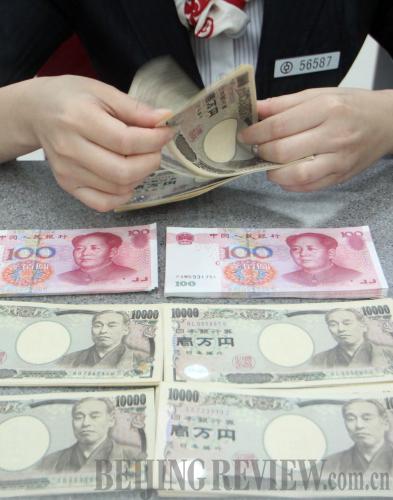|
 |
|
DIRECT TRADING: A bank clerk in Tancheng County, Shandong Province counts banknotes of the Japanese yen (ZHANG CHUNLEI) |
Shanghai Hyron Software Co., having business relations with the Japanese market, started receiving favor from investors recently thanks to the June 1 official start of direct yen-yuan trading in the Shanghai and Tokyo markets.
The move makes the yen the first major currency besides the U.S. dollar that can be directly traded with the yuan. Conducting transactions without using a third country's currency will reduce transaction costs and lower risks involved in settlements at financial institutions.
Last year, Hyron Software registered a revenue of 312 million yuan ($49.5 million) in the Japanese market, accounting for about 80 percent of its gross revenue. Japan also contributed to almost 90 percent of Hyron's profits from main businesses. In the days to come, direct yen-yuan exchange will definitely benefit the company by significantly cutting down trade settlement costs.
China's central bank said the development of the direct trading of the yuan and the yen will enhance their statuses in bilateral trades and investments, strengthen financial cooperation and shore up the increasingly expanding Sino-Japan business interactions.
Beneficial leap
At the micro-level, firms like Hyron Software are the biggest winners since direct yen-yuan trading means lower exchange costs in Sino-Japan business activities.
China, Japan's fourth largest trade partner, also has the island country as its second business associate. Last year, Sino-Japan trade totaled $344.9 billion. With the direct trading policy adopted, a total of $3 billion will be saved in transaction costs.
"At the macro-level, direct trading will contribute to improving convenience of both countries' currencies and reinvigorating the Tokyo market," said Ding Zhijie, professor of the University of International Business and Economics.
Both sides can also take it as a means not only to manage and reform the international monetary system, but also to improve mutual understanding and regulate exchange rates and foreign exchange markets.
Ding notes that direct yen-yuan exchange can also show the rest of the world their confidence in building a free trade area among China, Japan and South Korea.
At the Fifth Trilateral Summit Meeting among the three countries held in Beijing on May 13, Chinese Premier Wen Jiabao, South Korean President Lee Myung Bak and Japanese Prime Minister Yoshihiko Noda agreed on the start of the China-South Korea-Japan Free Trade Area (FTA) talks within 2012. With a 1.5-billion population, the FTA, making up 20 percent of the world's economy and 70 percent of the Asian economy, will match North America and the EU to become the world's third economic zone.
Financial cooperation is a major condition in establishing a FTA, while direct currency trading is an indispensable prerequisite. The direct yen-yuan trading will undoubtedly give a boost to the trilateral talks, showing a proactive gesture on this issue.
Actually, the China-South Korea currency settlement was put into practice on a trial basis. As trilateral free trade continues to expand, direct trading will not just be limited to the yuan and the yen—the South Korean won is also likely to follow suit.
Yuan globalization
"It is an important step for the globalization of the yuan, and marks the entry of the Chinese currency to the world monetary market," said Zhang Bin, a researcher at the Institute of World Economics and Politics at the Chinese Academy of Social Sciences.
| 